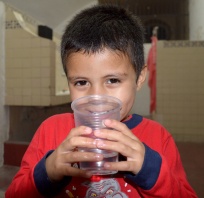
A child who benefits from appropriate medical care generally enjoys a better state of health during childhood and becomes a healthier adult. The right to children’s health also includes pre and postnatal care for mothers.
Following the framework from the United Nations and the World Health Organization on human development, the NPHI Medical Services Department used the Millennium Development Goals (MDGs) as our guidelines in 2016; complementing, but not replacing other goals that each NPH home may have individually.
During 2016, we decided to focus on sanitation and safe water, nutrition, immunization and mosquito-transmitted diseases as our main goals.
 SANITATION AND SAFE WATER
SANITATION AND SAFE WATER
Development and good health begins with having clean and safe water as well as access to health services, food and education. NPH homes monitor water with biannual microbiological and chemical testing and by reviewing their water infrastructure from the pipes to the water tanks. Also homes have added a second barrier to the water purification process with UV light. We are continuously working on improving the water collection process as well.
NUTR ITION
ITION
Across NPH homes we have seen improvements in the daily food menus, such as including more fruit and vegetables. This has led to a significant decrease in children with anemia and other deficiencies. Most of the countries have additional nutritional programs as well. NPH clinics monitor growth, development and anemia through biannual screening.
In some of our countries, we are facing a new epidemic that has spread throughout the rest of the world as well: overweight and obesity. Malnutrition is not just low weight but also overweight, as both are signs of not receiving adequate quality intake. NPH ensures adequate management to medical protocols and early detection.
VACCINATIONS AND HEALTH CAMPAIGNS
Vaccinations are fairly inexpensive when considering the benefits. They protect children against the risk of death and handicaps caused by the most common children’s diseases in poor countries: tuberculosis, diphtheria, tetanus, leprosy, polio, whooping cough and measles. At NPH we vaccinate our children, as well as offer awareness and health education campaigns, which can prompt a significant reduction in health risks. All homes have had done a great job at least once a month for children and caregivers, offering health education discussions that are age appropriate.
In 2016, we administered 3,662 doses of vaccines across all countries. Applying vaccines doesn’t mean the population is well vaccinated according to the age, though it is a good step to reach the goal. The average ratio of vaccination in NPH is 78-80% in most of the basic vaccines, but boosters are needed every year to maintain the protection. Our goal is to be at least 90%. Furthermore, we provide deworming to our entire child population and provide Vitamin A to children under 5 to prevent blindness. Funds from international NGOs and foundations for immunization completion and nutrition have been a key to continue to work and make improvements in the children’s health, as well as receiving advanced medication for children with HIV.
MOSQUITO-TRANSMITTED DISEASES
Countries where NPH works have a high prevalence of high-impact diseases, especially during the rainy season. Cleaning surroundings in our community is important to prevent the breeding sites of mosquitoes. Any collection of water is a threat for disease incubation. Fumigation and mosquito nets are necessary to prevent infectious, transmitted diseases such as Zika, chikungunya, dengue or malaria.
 NPH IMPACT
NPH IMPACT
The impact of NPH’s work in developing countries is significant. We work not only for the children living in NPH homes, but also for patients from the community and children attending NPH schools. NPH clinics support these students by providing: annual medical exams, nutrition screening, vision, hearing, dental care, immunization campaigns, one nutritious meal, deworming twice a year, supporting/finding a solution for special cases identified during screening, health education, and therapies according to availability. The most common daily clinic visits are: upper respiratory infections, traumas (from small wounds to broken arms or concussions), skin problems, parasites and gastrointestinal issues (stomachache, diarrhea).
ADDITIONAL SUCCESSES
• Restoration and remodeling of outdated clinics in Honduras and Haiti homes
• Preparing and coordination of three children traveling abroad for specialist treatment
• Implementation of psychology and therapy services in electronic medical records
• Comprehensive care with teams for children with severe disabilities
• Professional development: International NPHI medical workshop and training abroad on mental health care
The Medical Services team and local clinics work hard to apply our mission statement to our daily work: striving to reach an optimum health and wellbeing for children to live as healthy as possible. The success relies on the close cooperation between the Medical Services team and local staff, and establishing collaborative partnerships with local public health facilities and other NGOs.
On behalf of all the children, medical staff and NPHI Medical Services we want to thank all the supporters.
Pilar Silverman, MD, NPHI Medical Services Director
NPHI Medical Services Team members are:

Dr. Corinna Lawrenz, Regional Medical Coordinator of NPH Mexico and Bolivia; Dr. Pilar Silverman, Medical Director NPH International and Regional Medical Coordinator of NPH Haiti and Dominican Republic; Marta Garate, RN, Regional Medical Coordinator of NPH Honduras, Guatemala and Peru, Julia Spettel RN, Regional Coordinator of NPH Nicaragua and El Salvador, Nelly Fernandez, Psychologist, Mental Health Coordinator
